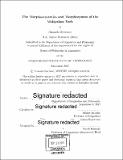The morphosemantics and morphosyntax of the Malayalam verb
Author(s)
Swenson, Amanda, Ph. D. Massachusetts Institute of Technology
DownloadFull printable version (16.55Mb)
Other Contributors
Massachusetts Institute of Technology. Department of Linguistics and Philosophy.
Advisor
Sabine Iatridou.
Terms of use
Metadata
Show full item recordAbstract
The questions posed and addressed in this dissertation are broadly questions regarding the nature cross-linguistic variation and why languages differ from one another in these particular ways. This thesis focuses on four known points of cross-linguistic variation in the verbal domain: tense, aspect, finiteness and the perfect. It uses data primarily from the Dravidian language Malayalam to explore these questions. Past work on tense and aspect in Dravidian languages (Amritavalli & Jayaseelan 2005) has claimed that Malayalam, along with the other Dravidian languages, is tenseless. This dissertation, however, shows that Malayalam is empirically different from other tenseless languages and that it does have morphology that encodes tense semantics and a TP. It further examines what have previously been called the two 'imperfectives' and argues that the first one is a type of progressive. The second form, is shown to be something between an interative and an imperfective. While the dissertation argues that Malayalam, has tense morphology and a TP, it argues that Malayalam lacks perfect morphology and a PerfP in, minimally, Universal perfects. The investigation of finiteness focuses on the empirical facts regarding the different non-finite forms in Malayalam and the theoretical implications of these facts. It points out a problem for classifying negation as 'finite' versus 'non-finite', as has frequently been done (Amritavalli & Jayaseelan 2005, a.o.) and argues that nonfinite uses of the -uka marker are progressive participles, that Conjunctive Participles are best analyzed as Stump (1985)-style absolutives and that -athu gerunds involve nominalization above the TP-level (cf. Borsley & Kornfilt 2000, Baker 2011).
Description
Thesis: Ph. D. in Linguistics, Massachusetts Institute of Technology, Department of Linguistics and Philosophy, 2017. Cataloged from PDF version of thesis. Includes bibliographical references (pages 247-256).
Date issued
2017Department
Massachusetts Institute of Technology. Department of Linguistics and PhilosophyPublisher
Massachusetts Institute of Technology
Keywords
Linguistics and Philosophy.